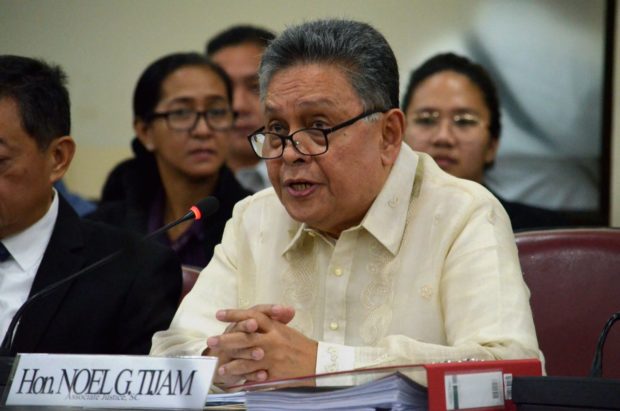“The Chief Justice is not the Supreme Court.”
Associate Justice Noel G. Tijam pointed this out as he and two other Supreme Court magistrates appeared in the House of Representatives’ impeachment proceedings against Chief Justice Maria Lourdes Sereno on Monday.
Associate Justice Teresita J. Leonardo-de Castro said she had repeatedly called Sereno’s attention for failing to abide by standard operating procedures and consulting the full court on various matters.
“Five years, I’ve repeatedly talked to her. Yet, she doesn’t stop disregarding the things she should inform the en banc about,” De Castro said. “Until when will we suffer?”
Tijam and De Castro appeared before the House justice committee to testify about the alleged irregularities and delays in the transfer of the venue of the criminal cases against the Maute group outside of Mindanao.
Associate Justice Francis Jardeleza and retired Associate Justice Arturo Brion were invited to talk about Sereno’s alleged “manipulation” of the nomination process of the Judicial and Bar Council (JBC) to block the former’s appointment to the high tribunal.
Maute cases
Saying Sereno “arrogated” to herself the matter of the Maute cases, Tijam told lawmakers that “the Supreme Court is a collegial, a consultative, a deliberative and participatory body.”
De Castro concurred that “we do not decide cases during lunch” and was not sure whether those who ate together consisted a quorum.
She said Sereno’s actions “showed no respect and courtesy to the Court en banc.”
On Jardeleza’s appointment, Brion reiterated his view that Sereno “manipulated” the nomination process and acted with “malice” when she invoked the unanimity rule, effectively a veto on the ground of questions on the then Solicitor General’s integrity.
Brion questioned why Jardeleza’s petition was not raffled off to a member-in-charge before June 30, 2014, when the JBC finalized its short list of nominees that excluded the Solicitor-General’s name. It was raffled off only on July 1.
At that point, there was only one and a half month left for the Supreme Court to resolve Jardeleza’s petition, in time for then President Benigno Aquino III’s deadline to name his appointment. Yet, Brion said it even took 10 days to prepare the order for the JBC to comment on the case. “I see this as a very questionable move,” he said.
Supplemental comment
The JBC’s comment was filed on Aug. 11, nine days before the deadline. Yet, Sereno even filed on Aug. 15 a supplemental comment to explain why she blocked Jardeleza’s appointment, citing his legal position on the arbitration of the Philippines’ maritime dispute with China. (See story below.)
Still, the high court managed to issue a decision within the remaining four days in favor of Jardeleza, allowing Aquino to appoint him on Aug. 19, 2014.
“The most malicious of all … I will not mince words here, is the supplemental comment of Aug. 15 that could hardly be answered,” Brion said of Sereno’s actions.
De Castro said Sereno effectively “acted as the complainant, the prosecutor and the judge against Jardeleza.”
In a statement, Sereno’s legal team maintained that as ex-officio chair of the JBC, she “acted in good faith and in accordance with the JBC rules.”
